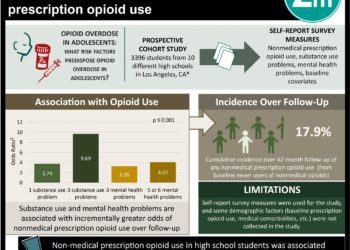Eating disorder hospital admissions among adolescents increased during the COVID-19 pandemic
1. This single center study found that hospital admissions among adolescents for restrictive eating disorder-related medical complications more than doubled during the first year of the COVID-19 pandemic.
2. A change in the distribution of insurance type was also observed, wherein adolescents that were hospitalized during the pandemic were less likely to have public insurance plans.
Evidence Rating Level: 2 (Good)
Study Rundown: Social isolation and decreased access to care have significantly impacted adolescent mental health during the COVID-19 pandemic. Adolescents with restrictive eating disorders (EDs) are especially at risk for complications, as a large component of their medical care necessitates in-person visits for assessment of weight, nutrition, and vital signs. Furthermore, disruption of adolescents’ normal routines may increase their use of eating and exercise behaviors. This study performed at C.S. Mott Children’s Hospital in Ann Arbor, Michigan, sought to compare adolescent admissions for medical complications of EDs during the pandemic to pre-pandemic data. Overall, they found that the total number of admissions increased by 123% during the first year of the pandemic when compared to the mean number of admissions seen in the prior 3 years. They also found that a smaller proportion of admitted patients were covered by public insurance plans, possibly representing more difficulties accessing care in this population. Although limited by its small cohort and single-center nature, this study raises serious concerns about adolescents with, or at risk of developing, restrictive EDs. Results highlight the need for continued in-person ED care, as well as increased screening and follow-up of adolescents at-risk by their primary care providers.
Click to read the study in PEDIATRICS
Relevant Reading: The impact of the COVID-19 pandemic on eating disorder risk and symptoms
In-Depth [cross-sectional study]: This single-center study based out of the C.S. Mott Children’s Hospital in Ann Arbor, Michigan, gathered data on 248 adolescents aged 10-23 years who were admitted between March 2017 to March 2021 with medical sequelae of restrictive EDs. Pooled pre-pandemic data (March 2017-March 2020) were compared with data from the first year of the pandemic (April 2020-March 2021) using X2, Fisher’s exact, 2-sample t-tests, and interrupted time series analysis to assess for differences in demographic variables and admissions. While the level change in admissions decreased drastically in the first month of the pandemic (-5.04 [95% CI: -7.78 to -2.29]; P < .001), numbers quickly recovered and then increased to more than double (123%) what was seen in the pre-pandemic years (1.58 [95% CI: 1.25 to 1.91]; P < .001). The only significant difference in demographic variables among hospitalized adolescents was that the proportion of admitted adolescents who were covered by public insurance significantly decreased, from 19.9% of admissions to just 8.8% of admissions (p = 0.02).
Image: PD
©2021 2 Minute Medicine, Inc. All rights reserved. No works may be reproduced without expressed written consent from 2 Minute Medicine, Inc. Inquire about licensing here. No article should be construed as medical advice and is not intended as such by the authors or by 2 Minute Medicine, Inc.







